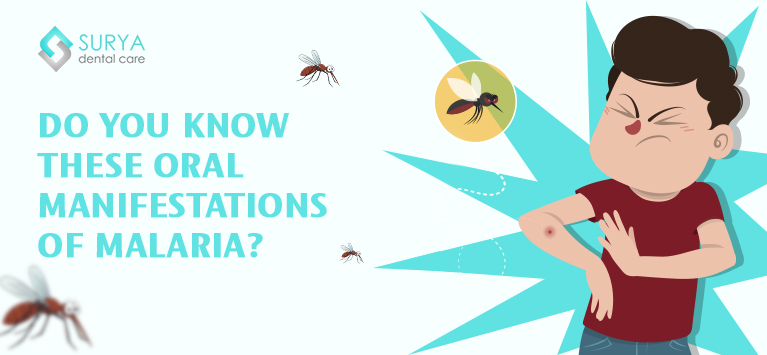
Malaria – The parasite disease is one of the killer diseases in the world. On average, around 4,00,000 malaria deaths occur every year globally. The infection begins with the biting of infectious mosquitoes especially female anopheles mosquitoes. When the infection progresses, it exhibits symptoms like cyclic periods of fever, dry cough, muscle or joint pain, and much more.
The malaria parasites weaken our body once they enter and are followed by various organ damage. Your oral cavity is not an exception. For instance, people with cerebral malaria encounter aching sensations in teeth and surrounding tissues. Keep reading to know more about the damaging effects of malaria on dental health.
How does malaria affect your mouth?
When an infective mosquito bites a person, it absorbs blood and injects parasites into the bloodstream through its saliva. In general, 4 different species (P. malaria, P. vivax, P. falciparum, and P. ovale) are responsible for malaria. Once the species enter the body, it remains in the liver for 6 days to 1 year.
Remember that this duration varies for each species so that their damaging effects also differ.
After that, the parasite is introduced to the bloodstream and begins to invade nutrient-rich red blood cells. This attack occurs every 48 to 72 hours so that the parasite tends to thrive or reproduce and causes inflammation in the red blood cells. Eventually, the inflamed red blood cells bursts and introduce the toxic metabolic byproducts they hold into the blood.
When the toxic substances carried by the blood reach the teeth, gums, and other oral tissues, they cause devastating effects.
What are the dental health problems associated with malaria?
In certain cases, the anti-malarial drugs people take upset the body’s normal function and are also exhibited with various dental problems. Here are the common dental problems by the malaria parasites:
- Soreness in tongue
- Oral dryness
- Impaired taste
- Longing thirst
- Trauma in teeth and their surrounding tissues
- Tongue sticking to the palate
- Difficulty in swallowing and mastication
Moreover, malaria provokes severe anemia in some people. Such malaria-induced anemia is bound to cause problematic oral conditions like
- Buccal mucosa in the oral cavity
- Atrotrempy of the oral mucosa
- Loss of filiform and fungiform papillae on the tongue
- Angular Cheilitis
Likewise, malaria is powerful to compromise our body’s immune system. Such malaria patients with the compromised immune system have high chances of developing oral candidiasis and a gangrenous infective condition called Cancrum oris (Noma).
Can Malaria treatments address these dental problems?
As there are no scientifically proven medications available to completely get rid of malaria, taking the prescribed vaccines to mitigate infection will protect the oral cavity as well. As mentioned earlier, certain medications taken to treat malaria left patients with difficulties like chemical stomatitis, blisters, lesions.
If you or your loved ones develop such blisters due to anti-malarial medications, take anti-fungal or antibiotic ointments, burn creams to get relief from.
Likewise, taking saliva substitutes is the best way to mitigate the dental discomforts instigated by malaria parasites. It is because malaria sufferers develop dryness in their mouths due to the infection. The antiparasitic agents taken to combat the infection also accelerate the dryness at times. Lack of salivary flow allows the dreadful microbes to thrive in your mouth thereby propelling various dental dilemmas.
Hence you should keep yourselves hydrated by drinking more water and taking saliva substitutes.
The interesting role of Toothpaste in the fight against malaria
Triclosan is an active ingredient in toothpaste and is useful in controlling plaque bacteria in the mouth. Researchers found that it is added in antimalarial medications because of its ability to inhibit the parasites become mature.
When malaria parasites enter the body, they stick to the liver for a few days, become mature, and reproduce. Then the parasite attacks red blood cells followed by causing various life-threatening complications. Triclosan targets the fatty acid enzyme called ENR (Enoyl-acyl carrier protein reductase) of the plasmodium parasite and inhibits the pathogen’s growth.
In simply, your toothpaste can prevent the growth of malaria pathogens in your body to a certain extent.
Bottom line
Malaria is bound to cause various life-threatening conditions like anemia, kidney problems, etc. However, many people are not aware of the disease’s impact on oral health. It is because the oral discomforts the deadly infection-causing are common oral problems in most cases.
Apart from blood transfusions, using infected syringes, malaria is transmitted by people who traveled through countries. Hence we recommend that consult your dentist immediately if you notice any abnormal things in your mouth after returning from your vacation or foreign trips. Such dental discomforts might be a warning sign of malaria.



